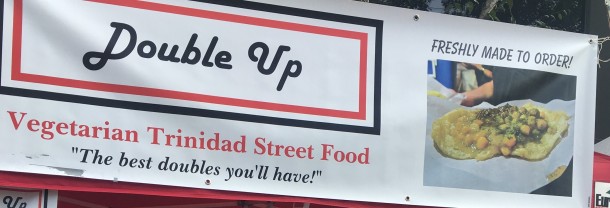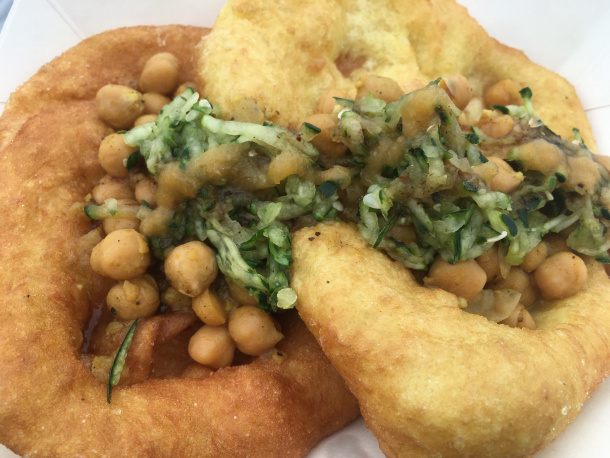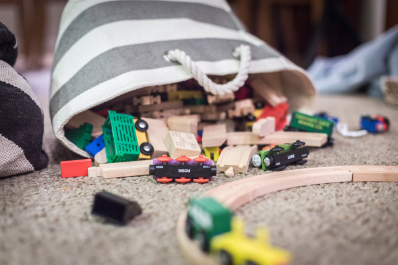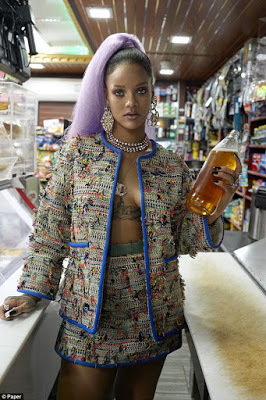I was just walking down the road at the Fremont Summer Solstice Fair this year, checking out the food stands to see if anything could be modified to be vegan, when I saw a sign that said “Vegetarian Trinidadian Street Food,” and basically squealed with joy. It was just before the fair opened so I had a chance to ask the owner of Double Up, Beverly Bates, about the vegan-ness of Trinidadian doubles, (which I guess could be described as fried dough chickpea sandwiches). Turns out everything in them and on them is vegan traditionally. No modifications necessary. Woop!

But this isn’t the best part of Double Up. The best part is that the doubles that they make are OUT OF THIS WORLD delicious. Yes, it could be the fried dough. Everyone loves fried dough. But what I think really sets them apart is the combination of savory, sweet, and spicy sauces that douse the double. You can choose one or all of the sauces, which include a cucumber slaw, sweet tamarind sauce, a spicy Scotch bonnet pepper sauce, just called “pepper,” and more. All of it combined makes your brain tingle when you take a bite. Super filling and only $8, is pretty good for this town these days. Confession: I had one each day at Fremont Fair and one each day at Umoja Fest. That is how good they are.
I’m so wild for doubles that I asked Beverly for an interview to help everyone get more familiar with Double Up’s awesome doubles. And here we are:

Q: Do you know origins of the Doubles recipe? They filling seems Indian-inspired and the baras more African-inspired. But it is so unique, maybe there are other influences as well?
Beverly: Doubles has its origins from India with the original dish called Chana Bhatura. With the introduction of Indian sharecroppers for cheap sugar plantation labor, the basic recipe also migrated to Trinidad. The Doubles we know now was developed in the late 1930’s by Emamoul and Rasulan Deen of Princes Town, Trinidad. Originally this item was sold as a single piece of bread (bara) with chick peas (chana) in a paper cone. Due to convenience and portability customers began asking for 2 pcs of bread to better hold the filling in place hence the word “doubles”.
Q: Where and when did you learn to make Doubles? Is your channa recipe a family recipe?
Beverly: I learned to make the components of doubles from my parents and reading cookbooks. As a child I did not eat “street food” (all cooking was done at home) and I did not taste my first double until I was an adult. We have always had curry in our diet so developing the method for cooking curry channa was very easy. The bread however, was a different story. It took many trials and errors to develop the right yeast dough that can produce a thin bara that does not absorb too much oil when fried.
Q: Why did you decide to launch a Doubles street food stand in the Seattle area? Are you surprised by the positive response?
Beverly: My path to opening my Doubles business started from necessity and major cravings for my native Trini food. I am a transplant from NY/NJ where I was able to quickly satisfy cravings for home food. Upon moving to Seattle for yet another corporate job I quickly realized, after 20 years in the corporate world, I was not happy nor satisfied with my profession. It was time to make the move into a field that will finally make me excited to “go to work.” It was time to me to step out of my comfort zone and take a chance as I didn’t want to wake up one day and regret not pursuing my dream. Through a little research, I realized Seattle was the perfect place to introduce a new culture and food to an already diverse population. The way I see it, lack of availability = big opportunity. So far the response to Trini fast food has exceeded my greatest expectations. I constantly sell out of product. Keeping up with demand is a wonderful problem to have.
Q: This food is automatically vegan, do you plan to offer other vegan items as Double Up grows?
Beverly: I have vegan recipes such as corn soup and aloo pies (spiced potato pattie) that I plan on introducing this fall but my main product will always be doubles. I want my offerings to stay narrow and focused on good quality, fresh, Trinidadian fast food. I strongly believe in offering only a few items but doing them exceptionally well.
Q: Is food justice or access to culturally-appropriate yet healthy food a factor in your business approach?
Beverly: I am currently not vegan but I am very aware of what I put into my body. I have also noticed that people in Seattle and surrounding areas take pride in demanding fresh, local, and healthy foods. I am excited and proud that I have a unique opportunity to fill that gap by offering food that is affordable, unique, healthy, and flavorful. As a Trinidadian, we take pride in our food as it represents our culture and diversity. I also believe to understand a new culture and people you must try their food. Food in every culture brings joy, understanding, and awareness. You can’t help but smile when you eat a double.
Q: What is the best way for people to find out where you will be on a daily basis?
Beverly: The best way to find me is through my Facebook page – doubleupwa. I keep this site up to day with up coming events but I am also available for private events. Within a few weeks, I will be launching my new website so please stay tune and “like” me so I can keep you advised of what’s happening with Double Up. I am also working on getting a food truck but that does take some time to find the right truck with the right equipment.
_________
Thank you so much for your time and passion for bringing Trinidadian food to Seattle Beverly! I would be thrilled to see you expand already.
The only downside of Double Up, is that you currently can only get their doubles if you are at an event or street fair they happen to be at! But I think it is a great excuse to explore the Puget Sound, trying to hunt down this incredible treat.
OK, if you aren’t excited to try these by now, I don’t know even know what I am doing here.
Share this:




